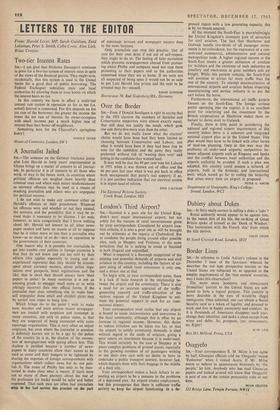A Journalist Jailed SIR,—The sentence on the German freelance journ-
alist Lutz Herold to forty years' imprisonment in Ghana brings up a matter of concern to all journal- ists. In particular it is of concern to all those who work, or may in the future work, in countries where political offences are weighed more heavily than criminal ones and where such minor misdemeanours as currency offences may be used as a means of reaching journalists and others who arc unpopular for political reasons.
I do not wish to make any comment either on Herold's offences or their punishment. Whatever his offences were and whether or not they existed, the sentence and the possibility that it may be re- vised make it necessary to be discreet. I do wish, however, to state categorically that I know nothing about Mr. Herold not known to all other news- paper readers and have no reason at all to suppose that he is either more or less than a journalist who knew—as so many of us do—men in opposition to the governments of their countries.
One reason why it is possible for journalists to get into trouble over politics in foreign countries is that they do not know and are not told by their editors (this applies especially to young and in- experienced reporters) that they should be circum- spect about currency matters, about police regu- lations over passports, hotel registrations and the like; that in short they should always have 'their papers in order.' In many countries it is not an amusing prank to smuggle small sums or to write jokingly incorrect data into official forms. If the journalist then does something else to make him- self unpopular these small and childish ploys may be turned into ropes to hang him.
Which brings me to the point I wish to make here. Another and more serious reason newspaper- men are treated with suspicion and contempt in many countries, not only in police states, is that they are suspected of being connected with some espionage organisation. This is very often an unjust suspicion, but even where the journalist in question is definitely known not to be a spy by the police of the country he is in, the shadow of the connec- tion of newspapermen with spying affects him. This shadow is justified because a number of news- papers in many countries allow their names to be used as cover and their budgets to be lightened by sharing the expenses of foreign correspondents with organisations which collect news but do not pub- lish it. The name of Philby has only to be men- tioned to make clear what is meant. If there were not so many of these phoneys about the test of the profession (or trade) would be safer and better respected. That such men are often bad journalists adds to the bad service this practice on the part
of espionage services and newspaper owners does to the news business.
Only journalists can stop this practice. Out of care for their own skins if not out of self-respect, they ought to do so. The feeling of false patriotism which prevents newspapermen abroad from protest- ing about Philby and company need not stop them protesting to their papers and to the authorities concerned when they are at home. If we were not all suspected of being spies it would not be so easy to put Lutz Herold into prison and the next to be arrested may be—oneself.
SARAH GAINHAM
Heerstrasse 70, Bad Godesberg I Rh., Germany






























 Previous page
Previous page